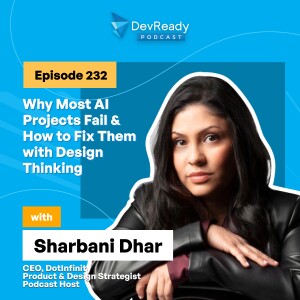

Why Most AI Projects Fail & How to Fix Them with Design Thinking | Ep 232 | DevReady Podcast
In this episode of the DevReady Podcast, host Anthony Sapountzis sits down with Sharbani Dhar, CEO of DotInfinity and a seasoned human-centred design expert with over two decades of experience. Sharbani shares her inspiring journey from a fulfilling corporate role at Australia Post to launching her own consultancy focused on strategic, design-led transformation. Motivated by a desire to truly own the problem-solving process, she stepped away from the security of a 9-to-5 role, driven by a passion for learning and a hunger for challenge. With support from her partner and mentors, she embraced the leap into entrepreneurship and has since built a business that thrives on delivering value through empathy, design thinking, and innovation.
Sharbani reflects on how her career has been guided by an unwavering commitment to learning. When work stops challenging her intellectually, it signals time for a change, something she encourages others to recognise in themselves. At DotInfinity, she’s created a space where learning is continuous and problem-solving is approached holistically. Rather than focusing on surface-level fixes, she champions end-to-end collaboration across teams to design solutions that align business goals with real human needs. She unpacks the essence of human-centred design as a way to solve the right problems by understanding the entire journey of both the customer and the internal stakeholders involved.
Through real-world examples, Sharbani illustrates how businesses often mistake symptoms for root causes. Drawing from her past experiences, she details how initiatives like reducing call centre volumes often miss the point by focusing on digital interfaces rather than underlying process failures and misaligned KPIs. True impact, she asserts, comes from empowering staff, aligning incentives, and redesigning systems from the ground up. Her insights reveal how thoughtful design leads to better outcomes for both employees and customers and ultimately, a healthier bottom line.
The conversation then shifts to the complexities of AI adoption. Sharbani highlights how many organisations rush into AI implementation without addressing data quality, infrastructure, or internal readiness. The result? Frustrating, low-impact solutions that rarely justify the investment. To combat this, she introduces the Responsible AI Canvas, a free, three-stage framework developed by DotInfinity to help businesses plan, assess, and govern AI projects responsibly. With guidance on data, ethics, stakeholder involvement, and human oversight, the tool ensures organisations don’t just adopt AI, but do it right.
Wrapping up, Sharbani outlines the foundational pillars of human-centred design: inclusion, empathy, iterative problem-solving, and the willingness to abandon ideas that no longer serve. She underscores the importance of external consultants who challenge assumptions rather than echoing them, serving as critical sounding boards rather than order-takers. By championing open collaboration and encouraging businesses to value outcomes over attachment to ideas, Sharbani leaves listeners with a powerful reminder: the best solutions are rarely the fastest, they’re the most human.
#AIReadiness #DesignThinking #HumanCentredDesign #TechLeadership #DigitalTransformation #InnovationStrategy #AIUX #StartupJourney
More Episodes
All Episodes>>Create Your Podcast In Minutes
- Full-featured podcast site
- Unlimited storage and bandwidth
- Comprehensive podcast stats
- Distribute to Apple Podcasts, Spotify, and more
- Make money with your podcast












